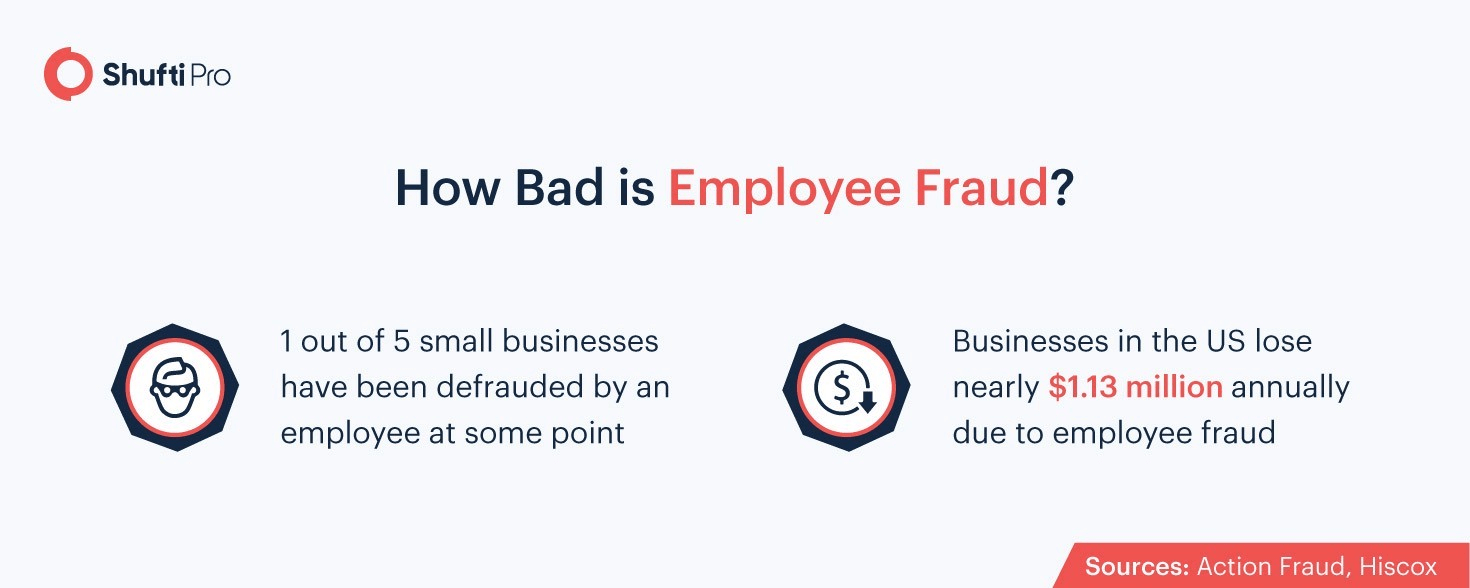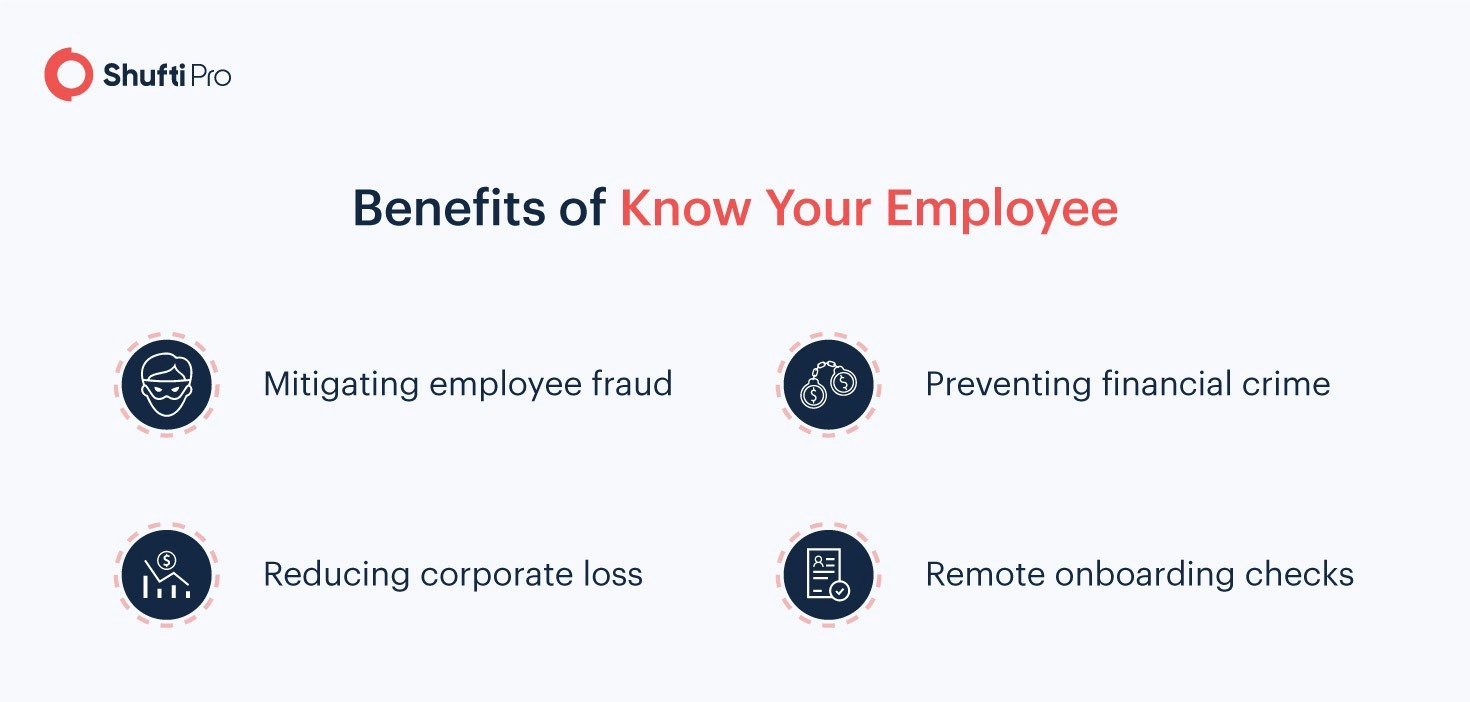Employee Verification – First Line of Defence Against Corporate Fraud

One day you wake up to the fact that the employee you’ve been trusting for years has been embezzling from your company all this time. What would you do? Immediately file a prosecution against him? This type of corporate fraud is not new and the actual problem roots back to when the individual was first hired without any background checks.
Employee theft accounts for as much as $50 billion a year, which is an alarming number in business losses. To address this concern, managers in an enterprise should have a robust mechanism to verify every candidate that applies for a job application before they are officially onboarded.
What is Employee Verification?
The process through which potential recruits are evaluated based on identity information and background checks is termed employee verification. It is not only limited to making the onboarding process smooth and secure but also emphasizes on building a strong employee-business relationship that is essential for smooth corporate operations.
Employee Fraud – A Corporate Hassle for Enterprises
Employee fraud can have many forms ranging from forging company checks to over billing customers and stealing the identity of customers. These white collar crimes often lead a business to bankruptcy especially startups that are financially emerging. Employees need to be loyal towards the company they are working for, and that includes abstaining from misuse of authority that can lead to data breaches or intentionally causing harms to the corporation. Here are some ways how dishonest employees indulge in corporate fraud.

Business Identity Theft
Impersonating a business entity without their official consent is business identity theft. Oftentimes, employees will pose themselves as an owner or an officer from the business they work for and will use company assets for personal use. Potential cases of this identity theft can be committed by individuals who have access to official records and user accounts.
A similar type of fraud is when, in a family business, someone takes out loans and money without authorization using the company’s name. Lack of internal control and not checking credit history frequently can be the primary reasons for this fraud.
Misuse of Company Resources
Employees can steal sensitive company information such as software code and personal data of admin accounts to start their own business on the sideline. Exploiting assets to sell it to someone else or to set up another business can lead the company to a large deficiency of income. Misusing company resources can also include stealing of office property like, laptops, record files and hard cash. Making sure side business activities are not performed during work hours can reduce the chances of employees taking advantage of company resources.
Hiring Fake Employees
A hiring manager in an organization could hire fake employees that act as money mules. When the candidates are successfully onboarded, the manager may ask them to perform transactions to launder money through the business. Common reasons for this type of employee fraud are owners trusting their subordinates and not checking up on them for a while. Absence of reporting rules and transparency between staff and administration can cause this fraud to prosper. However, requesting frequent work reports from your employees can reduce the possibility of falsified hiring of individuals.
Voiding Transactions and Double-dipping
Pocketing payments and void transactions at cash registers is normal. This is quite common in Small and Mid-size Enterprises (SMEs) where conventional point-of-sale systems are not able to detect false transactions due to lack of proper identity verification protocols. Another way an employee will try to commit corporate fraud is when they get two reimbursements against a single business expense or claim. Lack of proper checks for underlying receipts and not having an expense management software can cost businesses a good deal of their income.
Verify Your Employees to Trust Them
Employee Verification or Know Your Employee (KYE) is the cornerstone of strong and trustworthy relationships between a business and its employees. Verifying employees before they actually get hired clears any doubts of them being potential criminals for the company. Apart from that, KYE also entails background checks on the recruit that can significantly take down corporate fraud and losses in the long run. Let’s have a look at what corporate benefits can companies reap through employee verification.

Decide Who Accesses What
When it comes to business entities, it is important to keep a check on which employees have access privileges to office premises and which to sensitive records. Today, with robust identity verification tools in place, it is easy to identify whether an employee is an executive or a mid-level resource when they come to the workplace. A Know Your Employee solution built with facial biometric verification can store unique identity features that can later be used by authorized staff to gain privileged access to company assets/resources and digital workplace.
Remote and Secure Employment
With digital solutions surfacing the market, remote onboarding is becoming increasingly popular in the corporate sector. These solutions with the ability to verify documents digitally have opened new roads to achieve Know Your Customer (KYC) standards for businesses. The identity information extracted from user ID documents are verified against the facial identity through quick and reliable biometric authentication. This reduces the chances of fake recruits associating ties with a business organization and elevates the employee verification criteria.
Prevent Corporate and Financial Crime
Financial crime such as money laundering through businesses is quite common these days. To mitigate corporate losses and to combat identity thieves impersonating as loyal workers, employee verification is the need of the hour for every business. Know Your Employee checks are essential since they enable businesses to catch bad actors before they harm the company. Identifying high-risk individuals through an employee onboarding software can save the company’s brand image that will allow better sales opportunities and market credibility.
Key Takeaways
- Employee fraud takes a toll on a company’s revenue as well as its reputation in the long run
- Impersonating as a business owner, misusing resources, hiring fake employees and taking false benefits all are instances of employee theft
- Employee verification is necessary to ensure onboarding of legitimate individuals and preventing financial and corporate fraud
To learn more about digital customer onboarding solutions, you can talk to our experts.

 Explore Now
Explore Now













